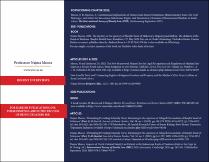Aspects of Dutch colonial family law related to the Indonesian rajah of Tambora’s exile at the cape
Abstract
The Muslims who arrived at the Cape during the first period of Dutch colonisation in the seventeenth century hailed from different geographical locations, were of different cultural and ethnic backgrounds and, more importantly, were of different social ranks ranging from slaves to royalty. This chapter focuses on the family of one such royal exile, the Rajah of Tambora, who had ruled over a small kingdom in Indonesia, and the invidious socio- economic position in which his innocent family was placed when he died at the Cape during a period of Dutch occupation of both countries. The Rajah arrived at the Cape at the end of the seventeenth century and quite unusually, spent two periods in exile there. During his second period of exile the Rajah, until he died, and his wife, after he died, were denied separate requests to return home. Their five children, four of whom chose to convert to Christianity and subsequently entered into marriages at the Cape with Christian spouses when it was uncommon to do so, were all born Muslim during or between his two periods of exile.

